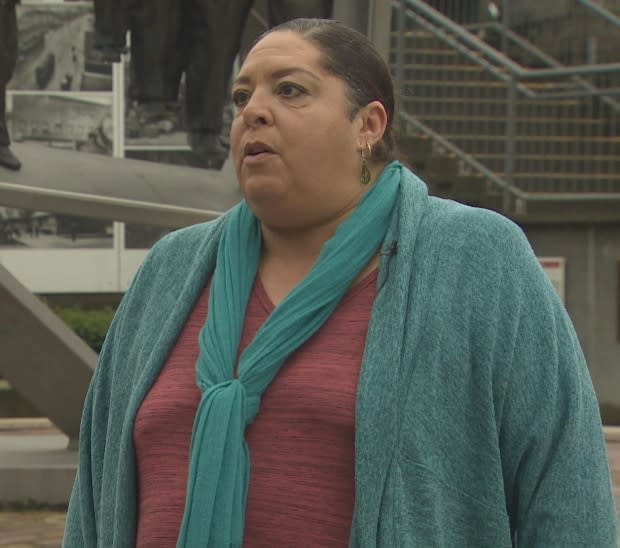'It's appalling': Homeless advocates say Metro Vancouver desperately needs more public washrooms
It's a New Westminster-based petition, but it addresses an issue that's common all over Metro Vancouver — it's tough to find a bathroom when you need one, especially if you're homeless.
SkyTrain stations don't have them, many businesses only make facilities available to paying customers and washroom doors are usually locked after dark at parks.
Rhonda Cummings, whose organization New Westminster CAT Peer Group started a petition calling for more public bathrooms, says people on the street don't have many options.
"I've seen human feces right outside my parking garage," she said.
"I just think it's appalling that there's nowhere for people to go."
Cummings' campaign deals solely with New Westminster, but homeless advocates in other cities hope it sparks a regional discussion.

Long standing issue
The issue received national attention in 2018 when a video was posted online showing a woman defecating on the floor of a Langley Tim Hortons after she wasn't allowed to use the washroom.
Friends of Langley Vineyard Church Pastor Leith White says he wanted a portable toilet on his church's property after the incident but it wasn't allowed because of zoning issues.
"It's the No. 1 for homeless people," he said.
"We're opening up our doors here all the time for people who need to use the bathroom at our church."
White says he's had conversations with municipal officials and local businesses, but little has changed since the Tim Hortons video went viral.
Mike Musgrove, who runs Surrey Urban Mission, says he's also been arguing for years that bathrooms are a basic human right.
He says concerns about costs, drug use and maintenance should be outweighed by the community's responsibility to let its most vulnerable citizens live with dignity.
"Let's build them and then let's monitor them," he said.
"We need to invest in these things."

Relief in sight?
Emily Scoular, who has a master's degree in architecture from the University of British Columbia, says the biggest deterrent to building new public bathrooms is the cost of maintaining them.
Scoular, who wrote her thesis on washrooms, argues the investment is well worth it.
"I don't think it's right to deny people to use a washroom," she said.
"It is a public issue and it's something that I think local governments and local government agencies need to address and take ownership of."
TransLink's long-awaited customer washroom implementation strategy, which has been in the works since late 2018, is expected to be completed by the end of the year.
"We've heard from our customers for years that making washrooms available should be a priority," spokesperson Jill Drews said in an email.
"We have found that it's possible to offer customers access to washrooms that are clean and safe."
The transit authority, which currently has washrooms at each of its SeaBus terminals and onboard West Coast Express trains, is considering building washrooms on TransLink property, working with partners to offer a network of third-party washrooms or a combination of the two.

Still waiting
Cummings says she doesn't understand why it's taking so long and in the meantime, she'd like to see portable toilets placed in high-traffic areas.
Eventually, she'd also like to see the city offer showers and laundry service to its homeless population.
She says the first priority, however, is providing people with a place to do their business.
"We're all human beings," she said. "We all need to go to the bathroom."
CBC Vancouver's Impact Team investigates and reports on stories that impact people in their local community and strives to hold individuals, institutions and organizations to account. If you have a story for us, email impact@cbc.ca.


